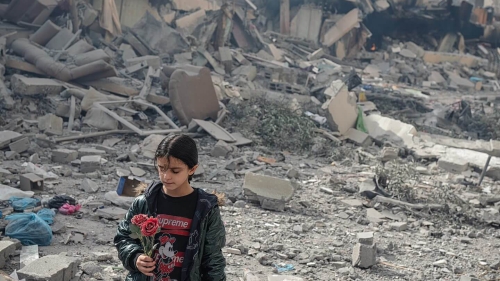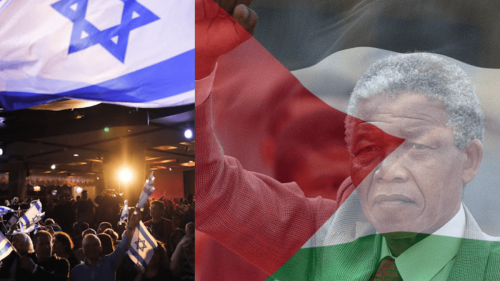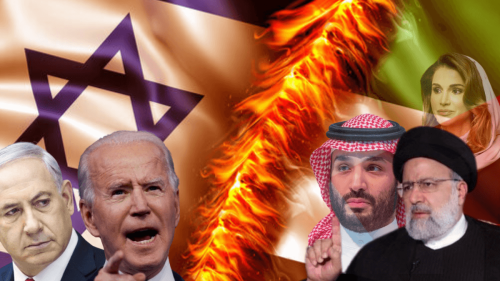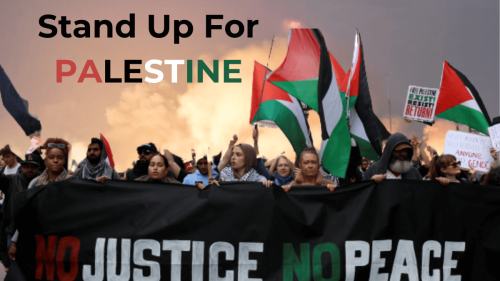Bombings, Government Crackdown on 'Islamists' Dividing People of Newly Independent Uzbekistan
Zyolfir Zeyahanova last saw her husband on Uzbekistan's state television news when he was paraded across the screen as an example of an "Islamic terrorist." "But he's not an extremist," the 39-year-old schoolteacher says of the quiet market trader, who never showed interest in politics or joined a religious group. "He just wanted to wear a beard as a sign of the maturity of his Islamic faith."
Police had told Akilhan Zeyahanov on several occasions that if he refused to shave off his beard they would be back. But he didn't think wearing a beard could possibly incur more than a few cents in bribes.
"We were at a red traffic light," continued Zyolfir. "A car from the SNB [the Uzbek secret police] drove up and took him away. They accused him of religious fanaticism, planted hashish, opium and heroin on him and arrested him. He has been in jail ever since."
Hundreds of bearded men have been arrested on what appear to be trumped-up charges of weapons and drug possession since a series of six car bombs rocked Tashkent on Feb. 16. The explosions killed 15 people, injured many more, and damaged government buildings. Islam Karimov, the president of Uzbekistan, claimed immediately that this was an attempt on his life, and blamed Islamic fundamentalists. Although there was little evidence to support this, ever since the bombings, the government-to all intents and purposes an elected dictatorship-has accelerated what was already a harsh crackdown on openly religious people.
Police are storming into bazaars ordering men to shave off their beards. Schoolteachers wearing veils in the classroom have been told to change into European clothes or face dismissal. Entire families of men suspected of involvement in the bombings have been detained and interrogated for up to 15 days without being charged.
Fear now dominates the atmosphere in this Central Asian republic. According to Cassandra Cavanaugh of Human Rights Watch, "police are blatantly planting evidence. Masked policemen are conducting searches with no warrants and taking away family members in the middle of the night. There have also been first-hand reports of severe beatings and horrible mistreatment of those arrested."
Hundreds of people are reported to have been arrested for their religious beliefs-although no official figures have been released-despite pressure from international organizations on the government. But even before the attack, Muslims were being arrested. In a bomb-free 1998, Uzbekistan's Independent Human Rights Watch estimated more than 1,000 were detained.
During the Soviet period, the practice of all religion, Islam, Christianity, Judaism,was banned. For the mostly Sunni Muslims of Central Asia, the Qur'an was forbidden, and a trip to one of the few remaining mosques could result in dismissal from a job or denial of admission to a university.
But since gaining independence from the Soviet Union in 1991, Uzbekistan and the four other Central Asian republics-Kazakhstan, Kyrgyzstan, Turkmenistan and Tajikistan-have undergone exuberant religious revivals. Thousands of mosques have been built or reopened-some from money raised locally, others from donations by countries such as Saudi Arabia and Iran. Madrassas (Islamic educational establishments) have opened and people are reading the Qur'an in their homes. In Uzbekistan's capital, Tashkent, women covered from head to foot can be seen shopping at the bazaars, next to the city's mini-skirted Russian women. In rural areas, there have been reports of plural marriages.
The rebirth of Islam in Central Asia has given Western governments, Russia and some local citizens cause for concern. They fear the rise of an exaggerated version of the strict school of Islam they call Wahhabism, which they feel is being exported from or encouraged by zealots from Saudi Arabia (who call it unitarianism). In Uzbekistan such anxieties have been compounded by civil wars in neighboring Tajikistan and Afghanistan, in which competing groups of Islamic extremists have seized power.
President Karimov's religious policy has been to slowly strangle the republic's Islamic revival. Some mosques opened in the early days of independence have been closed. The use of loudspeakers in the call to prayer has been banned. Quotas have been imposed on the number of Uzbeks permitted to travel each year to Mecca (now the republic's most popular charter flight destination). Female students in Tashkent who refused to take off their veils on campus had their grants canceled and were later expelled from the university three weeks before they were due to graduate. Religious attire has been forbidden on public transport.
Nowhere has the crackdown been more strongly felt than in the dusty Namangan region of 1.7 million, situated east of Tashkent in the Ferghana Valley. A conservative and rural area made up entirely of Uzbeks, unlike the rest of the republic, which has a diverse mix of Russians, Tajiks, Kazaks, Tartars, Koreans and Karakalpaks, Namangan is experiencing a revival unparalleled elsewhere in Uzbekistan.
On Muslim holidays the largest of the town's 600 mosques is filled to capacity when more than 10,000 people attend. While in Tashkent young Uzbeks wear imported cargo pants and T-shirts. In Namangan they dress in traditional embroidered silks and quilted robes. Dressmaking is apparently one of the few growth industries in the town.
The government says extremist religious organizations are based in the Ferghana Valley and it has bolstered the police presence in the area. Phones have been tapped and people followed. According to Gulamjam Holmatov, a human rights activist in Namangan, "secret police officials are now asking the imam to identify those showing a keen interest in Islam." In the wake of the bombings, the prisons are said to be overflowing.
But officials believe other countries to be supporting underground extremist religious groups in the Ferghana Valley. The Foreign Ministry says it has evidence that people from the area are being trained in terrorism at secret centers in Pakistan and Afghanistan. "These people want to destabilize the country and inspire an extremist frame of mind...They want to replace the constitutional order with an Islamic government of the most extreme form," said Uzbekistan's foreign minister, Abdulaziz Komilov.
There have also been reports in the pro-government media of missionaries from Tajikistan distributing videos calling for an Islamic revolution and of veils hidden in food aid parcels from Iran, which have then been handed out in the mosques. (For its part, Tajikistan is accusing the Uzbek government of backing a failed uprising in northern Tajikistan in November.)
Such media reports have justified the government's crackdown in the eyes of many Uzbeks. For every imam or human rights activist who says the government's policy is a flagrant violation of rights, there is a housewife or caf owner who will express concern that the country may be the next Tajikistan or Afghanistan.
"We have the potential for a Taliban situation here," says Marfua Tokhtakhodzhaera, a leading Uzbek feminist. "There was a lot of discussion about our national identity following independence. But there was no intellectual work done. An Uzbek woman's identity is now that of an Islamic woman."
But ask many religious figures about religious fundamentalism and they will deny the existence of a significant Islamic extremist force. "People simply want to visit the mosque and practice their faith after all these years of not being able to. I don't believe we have a problem with fundamentalism," says Yabaydyolohoshe Lyotfyolayev, rector of the Mula Kergiz Madrassa in Namangan. This view is shared by others, who also worry that, in the long-term, such a brutal suppression of religious people will actually create an armed opposition.
Members of Uzbekistan's weak, impotent and illegal opposition parties, Erk and Birlik, whose leaders are in exile, say President Karimov's crackdown is simply a way of deepening his iron-fist rule. They believe the bombs in February have given him an ideal opportunity to arrest his opponents in time for parliamentary elections scheduled for December. There have even been suggestions that the Karimov camp planted the bombs for this very purpose.
But there are plenty of other suspects, including disaffected Uzbek elite groups, the Mafia groups, or members of the administration. There have been articles in Uzbek newspapers saying the bombs were the work of Russian or Tajik secret services, as both countries have problematic relations with Uzbekistan. However, President Karimov chooses to accuse the attackers of belonging to both a Saudi-backed Sunni Muslim group and to Hezbollah, the Iran-backed Shi'i militia in Lebanon.
A supposedly open trial of the bomb suspects opened in Tashkent on June 2. However, local people, family members and international observers are already complaining at being kept out of the courtroom.
Meanwhile, Zyolfir and the wives of other bearded men arrested on drug charges continue to wait for news from the husbands they are forbidden to write or visit. Occasionally, they meet with foreign diplomats or representatives from international groups in the hope that publicity will help their cases. Even this is becoming an increasingly risky business. The family of one religious man arrested was called upon by the police shortly after giving an interview to the BBC.
"My children ask me all the time where their daddy is. I say he's coming back soon, but inside I'm crying," said Myoharram Abdyosamatova, whose bearded husband is in jail. "This is worse than the Stalinist period."
Lucy Jones is a free-lance journalist based in Tashkent
Article first appeared in the July/August 1999 edition of the Washington Report On Middle East Affairs. Reprinted with permission.

















